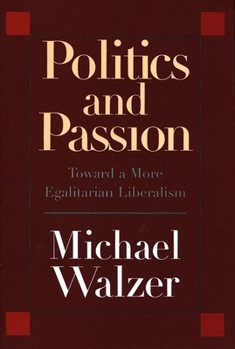Politics and Passion: Toward a More Egalitarian Liberalism
Select Format
Select Condition 
Book Overview
Liberalism is egalitarian in principle, but why doesn t it do more to promote equality in practice? In this book, the distinguished political philosopher Michael Walzer offers a critique of liberal... This description may be from another edition of this product.
Format:Paperback
Language:English
ISBN:0300115369
ISBN13:9780300115369
Release Date:June 2006
Publisher:Yale University Press
Length:208 Pages
Weight:0.55 lbs.
Dimensions:0.5" x 5.5" x 8.1"
Customer Reviews
1 rating
Raises some interesting issues about liberalism
Published by Thriftbooks.com User , 19 years ago
Nobody ought to expect political ethics to be easy. And maybe that's a good way to start thinking about the topics in this book. Walzer asks us some tough questions right away. Try this one first. Should liberals be tolerant of totalitarian groups within their society? There is no easy answer. If we rule that some religious parents have no right to raise their children in religious schools we would be saying, in effect, "We're tolerant! We're liberals! We tolerate all liberals! And we don't tolerate others, but so what ... they're different than us!" Obviously, that won't do at all. If we go to the other extreme, and tolerate everyone, no matter how much of a threat they are to our society, that won't work either. If we smugly decide to do something in between these two extremes, that means being arbitrary rather than following easily applied principles. Walzer concludes that when "political power is at stake, we should tilt decisively against the totalizing groups," just for the sake of decency. But he reminds us that this is merely a guideline. "It doesn't solve the problem of day-to-day coexistence." Such problems require "a long and unstable series of compromises." The author also talks about involuntary associations, such as family or cultural group. Are we morally obliged to defend our families or cultural groups if they are attacked? Walzer thinks we generally are. Walzer also asks about the concept of deliberation. That's different than debate, which is simply a contest in which one tries to win, even with an unsound argument. Deliberation involves trying to make as good a decision as possible about what policy to pursue. Here, the author points out that liberal societies debate thinkable policies with great freedom. But they also define what policies are thinkable, and those which are not simply don't get brought up. A final topic is passion in politics. Do we want our villains to be cold and calculating? Or wild and frenzied? Do we need more passion or less? I guess I disagree with the author here. Any human is likely to be passionate enough about any interesting issue, the more so if there is widespread debate about it. As a liberal, I'm not afraid of fickleness on social issues. I'm not afraid of having kids disagree politically with their parents. But I am afraid of people going overboard and taking dubious and illogical political positions, unsupported by facts, which they then passionately refuse to reconsider. In any case, the author has some good ideas, and I recommend the book.





